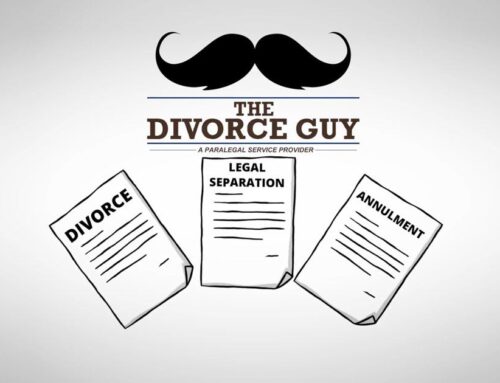Divorcing With Children in Arizona
Preparing for a divorce is stressful enough, but when you have children to consider, the process can feel overwhelming. Getting a divorce in Arizona is known as obtaining a dissolution of marriage and requires filing with the state courts to legally end your marriage. This will allow both of you to move on with your lives and remarry someone else down the line.
Once the Decree of Dissolution is granted, it will do several things. These include:
- Legal termination of the marriage
- Will establish legal custody (legal-decision making), child support, and parenting time for any children under 18 years old
- Spousal support (when applicable)
- Determination of separate property and asset distribution
- Apportion debt responsibility
- Restoring spouse’s former last name (when requested)
Requirements for Dissolution of Marriage in Arizona
Before you can file for divorce, you must meet the legal requirements set forth by Arizona laws. One of the most important requirements is that you or your ex must have lived in Arizona for a minimum of 90 days prior to the filing date. This is also applicable for members of the military who are stationed in Arizona. If you do not meet the 90-day requirement, you must wait until you do before proceeding, otherwise the court will throw your case out.
When you are getting a divorce and have children, the child’s primary residence has to be Arizona. Your children must have been living in Arizona for the previous six months, and decisions regarding parenting time, legal decision making, and child support need to name the primary residence as Arizona.
Grounds for Divorce
Arizona is a no-fault divorce state, which means neither party is required to show fault or specific grounds for why they want to dissolve the marriage. The only thing that is required is that one spouse alleges that the marriage has no chance of reconciliation and is irretrievably broken.
If the parties agree to all the terms of the divorce, including those related to custody and support, the process may take considerably less time than if the sides cannot reach an agreement. If both spouses agree, you will submit a Consent Decree of Dissolution of Marriage to the Court and the court can sign the decree if everything looks to be in order. This will terminate the marriage, and there is no need for either side to appear in court.
Domestic Relations Education on Children’s Issues
If you have children under the age of 18, you should know that a requirement in Arizona is for both parents to attend a parent education class, which is known as “Domestic Relations Education on Children’s Issues.” You and your spouse will have 45 days from the filing date or being served with notice to attend the mandatory course. Each parent must register and take the course in person. It does not matter if you are the one responding to the petition or not.
This course is mandated by the Arizona Legislature with the purpose of trying to teach parents how aspects of a divorce can affect children. This includes talks on separation and divorce, conflict, blended family, and more. Parents can learn how to reduce the risk of long-term damaging effects on the separation and transition to a “new normal.”
Failure to take the course can delay the entire divorce proceeding, and it can also have long-lasting consequences. The court can take this into account when there are future requests for modifications in parenting time, legal decision making, and/or child support.
Determining Child Custody
When most people think of custody, they think about who physically has the children living in their home. Custody is actually two-fold and covers two separate and distinct issues. The first is legal custody, and the second is parenting time arrangements.
With legal custody, the court may grant joint legal custody or sole custody. Legal custody refers to who has legal decision-making authority for things like education, medical care, etc. If one parent has sole legal custody, he or she has the right to make those decisions without consulting the other parent.
The other aspect of custody involves parenting time. This is the amount of time each parent will spend with the children. It includes provisions like weekly access, holidays, and vacation schedules. Despite the common belief that the court always favors the mother, there is no law that supports this. The court will determine what arrangements are in the best interest of the children, which is the law’s number one priority in Arizona.
The court has a number of factors they consider when making a decision this important. Some of these can include how well adjusted the child is to each parent’s home, the emotional and physical well-being of each parent, what the child wants, and whether one side is more likely to allow the other parent to exercise his or her right to approved parenting time.
While the courts prefer to grant joint custody, certain situations may show that sole custody is in the child’s best interest. Situations involving domestic violence or drug abuse are ones in which the court may choose to grant sole custody to only one parent.
Child Support in Arizona
Both parents have a legal obligation to help financially support their children. The parent who has physical custody of the children is responsible for providing his or her fair share by taking care of them on a daily basis. The other parent is usually referred to as the non-custodial parent and is ordered to pay a certain amount of child support to meet his or her support obligations.
Arizona calculates child support using the Arizona Child Support Guidelines, which utilize an Income Shares Model for calculating support. There may be situations in which a parent is ordered to pay child support until the child reaches the age of majority. Payments could also continue beyond a child’s 19th birthday in some cases, such as if he or she is disabled and cannot support him or herself. If a child is still in high school when he or she turns 18, the court could require that payments continue until the child finishes high school.
Child support is one of the most important obligations, and the court will expect a parent to put that first, before handling other financial matters. It is also important to note that child support is a non-dischargeable debt, so a parent cannot file bankruptcy in hopes of getting out of making these payments. If a parent fails to pay child support, the court has the authority to find him or her in contempt of court, which may include sanctions (fines) and/or jail time.
Spousal Support or Alimony
In some cases, a court may also award a spouse alimony or spousal support. This can happen even when there are child support payments being made. If a spouse can establish that he or she lacks the sufficient resources and money to provide for their “reasonable needs,” the court may opt to award financial support.
Marriages that last a long time, i.e., 20 years, are more likely to have an award versus a couple who was only married for a short time. The awards for spousal support will vary based on a number of factors that the court will consider. Each case is different, so the outcome will depend on the circumstances and the court’s position.
Awards for spousal support in Arizona will terminate if the recipient spouse remarries or if either spouse passes away. If there is an existing prenuptial agreement that stipulates how alimony is to be handled, it will be up to the court to look at the provisions of the marital agreement and determine if it is valid.
Arizona Division of Property Laws
Most states in the country use the rule of equitable distribution when it comes to asset division in a divorce. Equitable distribution means that the court will make an award that is fair and equitable to both parties. Arizona, however, is a community property state. This means that everything, in theory, is split 50/50. Community property is defined as any property that was acquired through the labor of either spouse during the course of the marriage. This is one area of a divorce where you may need to seek the assistance of an Arizona divorce attorney. In situations involving complex asset portfolios, what is separate versus community property is not always black and white.
Division of property in a divorce also extends to a division of debt. Debts incurred during the course of the marriage are usually presumed to be marital debt and a community obligation, while a debt incurred by one spouse prior to the marriage is usually deemed to be separate. Again, this is a determination for an attorney and/or the court to make.
Couples can opt to make their own agreements regarding the division of assets and debts, but ultimately, it is up to the court to decide what it will approve and whether or not the agreement is fair.
Learn More About Our Services
The Divorce Guy offers document preparation services throughout Arizona, and we are honored to share that our entire staff is certified by the Arizona Supreme Court. We have a workforce of skilled paralegals who have been assisting Arizona clients with all their legal document preparation service needs since the 1990s.
While you may find it necessary to retain your own counsel for legal advice regarding specific aspects of your divorce, especially if you have questions about specifics related to your proposed parenting plan or concerns regarding child support, our proficient team of paralegals can handle all the document preparation tasks, as well as some of the other complex issues that may arise.
Why should you spend thousands of dollars in attorney’s fees when you only need assistance drafting standard documents? We offer the same services without the need to incur hefty hourly rates. The Divorce Guy also offers the convenience of in-person consultations for those clients who feel more comfortable handling these types of legal matters in person.
As you conduct research online, you will scroll through search results for many different legal businesses in the state that advertise their document preparation services. However, documentation preparation is where most of their services end. These businesses offer no additional benefits beyond filling out your necessary and requested forms. Once the preparation portion of your documents is completed, you will be expected to figure out how to handle everything else that needs to be completed. This can include filing the necessary documents with the appropriate court and, in some cases, even hiring your own process server to serve any necessary parties.
These other document preparation agencies will not assist with any other pending issues either. This means that if you have any additional questions on a specific process or need to know how to file the documents properly, you will be forced to incur additional fees from a completely different legal service just to get the answers.
At The Divorce Guy, we take pride in offering exceptional customer service and maintaining a full-service agency. We will not leave you to fend for yourself with a mountain of paperwork that needs filing or make you figure out what court you need to contact, or whatever follow up needs to be done.
It is important to point out that we are not licensed practicing attorneys; therefore, we cannot legally engage in practicing law in Arizona or any other state. Essentially, this means we are barred from giving you any legal advice or telling you how to proceed with your individual divorce case; however, we can legally prepare all your documents while guiding you through the filing process itself. If you have any specific legal questions that relate to divorce, child custody, spousal support, or child support, we are more than happy to refer you to a qualified and licensed practicing Arizona divorce and family law attorney near you.
If you need other divorce related forms, or any other legal documents prepared, contact our skilled team at The Divorce Guy to see how we may assist you. We are committed to providing fast and friendly service, while offering flexibility and convenience, all at a reasonable low price. We have offices conveniently located in Tucson, and Mesa. Contact us today to learn more about Arizona document preparation services for your Arizona divorce and other legal document needs. We look forward to helping you with all your document prep needs.




